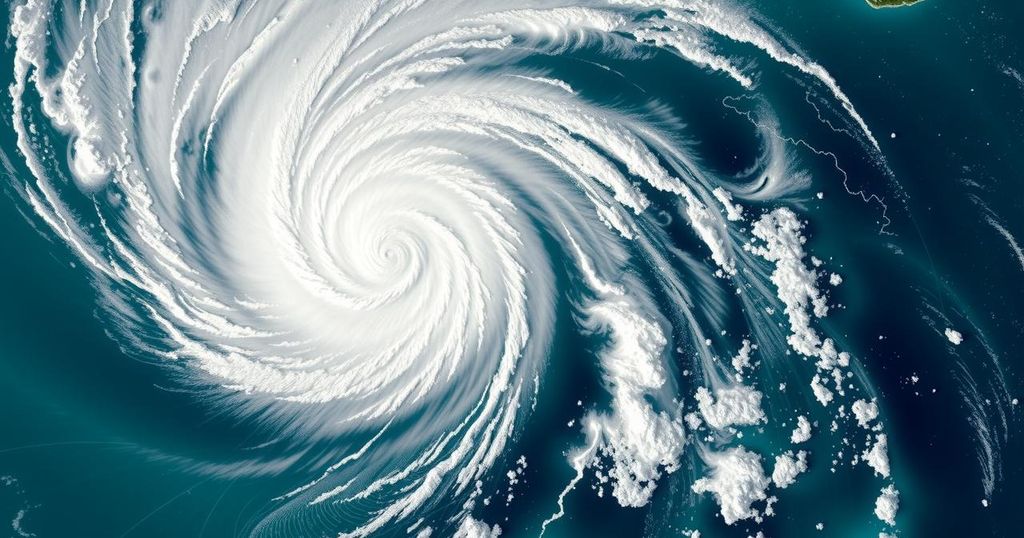Climate change
Global news
AFRICA, CHI, CHIDO, CLIMATE, CLIMATE CHANGE, EMMANUEL MACRON, MALAWI, MAYOTTE, MÉTÉO - FRANCE, METEO - FRANCE, MÉTÉO - FRANCE LA RÉUNION, MOZAMBIQUE, NATURAL DISASTER, NATURAL DISASTERS, POWER OUTAGES, REGIONAL SPECIALIZED METEOROLOGICAL CENTRE, REUNION, WMO
Isaac Bennett
0 Comments
Tropical Cyclone Chido Devastates Mayotte: A Historical Weather Event
Tropical cyclone Chido struck Mayotte on December 14, 2023, with winds exceeding 200 km/h, causing widespread devastation and loss of life. It marked the strongest storm in 90 years and prompted a national emergency response in France. Despite timely warnings, the cyclone’s unusual track resulted in severe impacts on the island, which is ill-equipped for such events. Meteorological forecasts predict an active cyclone season ahead.
Tropical cyclone Chido struck the island of Mayotte on December 14, 2023, unleashing winds exceeding 200 kilometers per hour, with gusts surpassing 225 kilometers per hour. This event marks the most powerful cyclone to impact Mayotte in nearly a century, as reported by Météo-France. Alongside strong winds, the cyclone generated torrential rainfall, registering 176 mm within just 12 hours, and dangerous sea conditions with significant wave heights averaging over 5 meters. The cyclone’s immense power caused damages to some observational installations belonging to Météo-France itself.
In response to the devastating effects, French President Emmanuel Macron declared a period of national mourning. An extensive emergency response initiative was launched as initial reports indicated that hundreds may have perished on this small island, which is typically unprepared for such severe tropical cyclones, particularly those exacerbated by informal housing structures. Despite timely warnings issued by Météo-France – over 50 hours in advance, including an amber alert followed by a red alert – the loss of life was substantial. The cyclone took an atypical path, bypassing Madagascar, which could have diminished its strength, and instead, it made a direct hit on Mayotte as a powerful tropical cyclone.
Cyclone Chido later made landfall in Mozambique on December 15, continuing to produce heavy rainfall across both Mozambique and Malawi. Météo-France noted that the influence of climate change on this event remained uncertain. “The impacts of Chido are above all due to its track and the direct hit on Mayotte,” emphasized Météo-France on its website. They stressed that the rarity of such occurrences, not seen for 90 years, limits their ability to assess climate change repercussions on such cyclones.
Furthermore, Météo-France La Réunion serves as the Regional Specialized Meteorological Centre (RSMC) Tropical Cyclone center within the South-West Indian Ocean, having accurately forecasted an early start to the 2024-2025 cyclone season in the region. In previous seasons, cyclone activity commenced in January, making this early prediction noteworthy. The seasonal outlook indicates a potential for 9 to 13 cyclone systems, with four to seven expected to reach tropical cyclone intensity during the upcoming season.
The Indian Ocean is prone to tropical cyclones, particularly during specific seasons influenced by various climatic and oceanic conditions. Cyclones are categorized based on their wind speed and potential for damage, with significant tropical cyclones posing serious threats to populated areas, especially islands like Mayotte. The island is not typically accustomed to cyclonic weather patterns of such magnitude, making the events surrounding Chido particularly extraordinary. Accurate meteorological forecasting plays a crucial role in mitigating cyclone impacts, and agencies like Météo-France are instrumental in monitoring and issuing warnings ahead of potential threats to facilitate emergency responses.
In summary, cyclone Chido’s catastrophic impact on Mayotte has highlighted the island’s vulnerability to severe weather phenomena despite prior warnings. The cyclone, marked as the strongest in the last 90 years, led to substantial loss of life and extensive damage, prompting a national mourning in France. Ongoing studies by meteorological authorities are essential to ascertain the influences of climate change on cyclone activity and preparedness strategies for future events. The season ahead suggests a likely increase in cyclone activity, underscoring the need for vigilance and preparedness.
Original Source: wmo.int




Post Comment